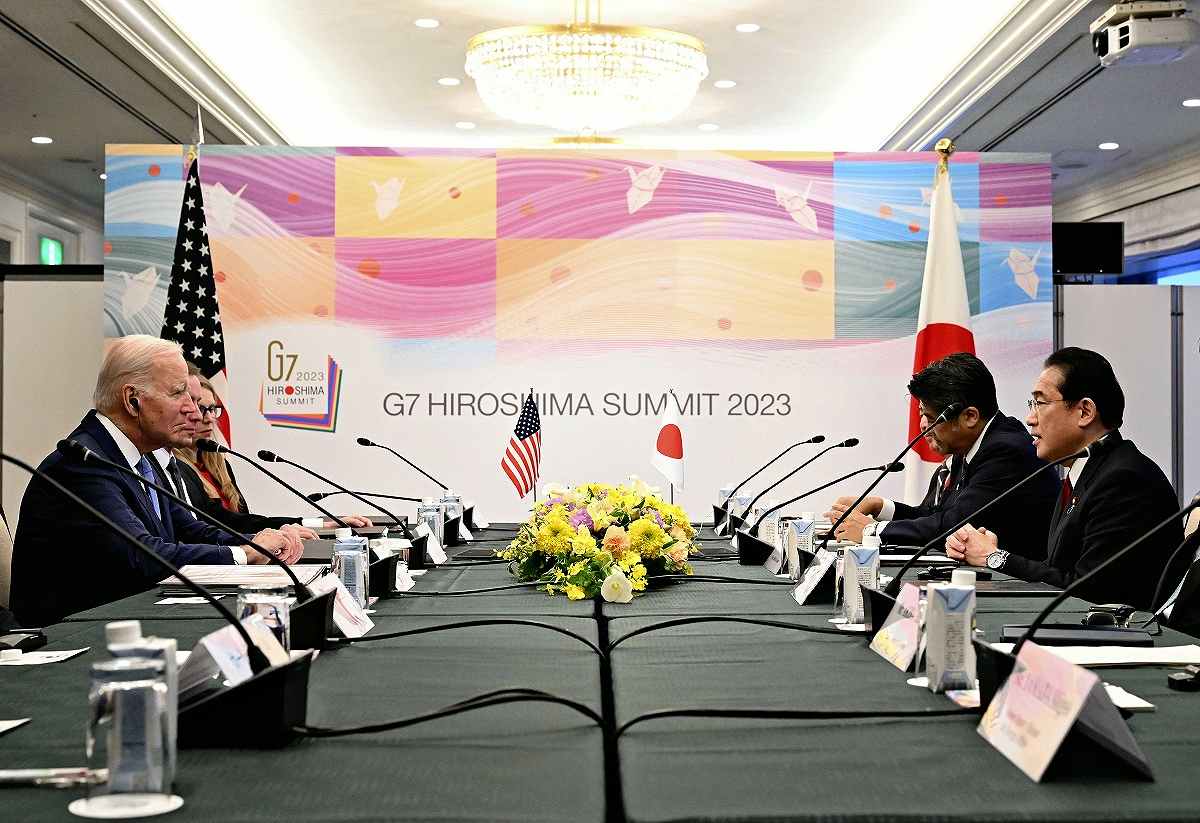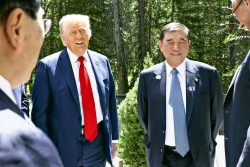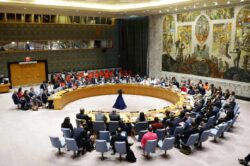
U.S. President Joe Biden, left, holds talks with Prime Minister Fumio Kishida in Naka Ward, Hiroshima, on Thursday.
16:59 JST, May 19, 2023
Prime Minister Fumio Kishida appears determined to make the Group of Seven summit a clear display of the G7’s solidarity in upholding the “rule of law” to the world.
The international order is at what could be described as a historic turning point. Can the G7 create momentum to prevent moves by China and Russia to “rule by force” from spreading?
A heavy responsibility rests on the shoulders of the G7 leaders at the Hiroshima summit, which kicked off Friday.
Kishida reiterated his resolve on the issue in a bilateral meeting with U.S. President Joe Biden at a Hiroshima hotel on Thursday evening.
“I’m confident that the G7 will demonstrate at the summit an unwavering will to uphold a free and open international order based on the rule of law,” said Kishida, who is chairing the summit.
Biden said the United States and Japan would “stand up” for “shared values” amid the increasingly “complex” international environment.
According to Kishida, the meeting was a chance to “engage in last-minute coordination” ahead of the G7 talks.
Kishida’s repeated comments about the importance of the “rule of law” are thought to be aimed at the actions of China and Russia. Moscow’s ongoing invasion of Ukraine is a clear violation of international law, and Beijing is continuing its attempts to change the status quo in the East China and South China seas, while also escalating its military intimidation of Taiwan. “A crisis is looming” for Japan, a senior Defense Ministry official said.
The phrase “free and open international order based on the rule of law” was, as called for by Japan, also included in the communique released by the G7 foreign ministers after their meeting in April. “We thought it would be easier to gain the support of more nations if we focused on this concept, rather than on certain political systems,” a Japanese government official told The Yomiuri Shimbun.
The Japanese government wants to use G7 unity as a foundation for building a wide network of like-minded countries that support the rule of law to contain China and Russia.
China is actively working to counter such efforts, such as by holding a summit meeting with the leaders of five central Asian nations this week.
However, the G7 knows it cannot take an out-and-out hard line against China, which has the world’s second-largest gross domestic product after the United States. At the summit, the G7 is expected to clearly set out the group’s opposition to any attempt to change the status quo through force, while also confirming the importance of working together with China on global-scale issues such as climate change.
China wields significant influence over Russia. As Russia’s invasion of Ukraine drags on, some officials in the United States and European Union have started to harbor expectations that Beijing might be able to use this clout in efforts to find a way to bring an end to the conflict.
Seeking a balanced approach likely will be especially pronounced in economic fields. The G7 is poised to agree to make supply chains of semiconductors and other goods more resilient to counter China, and also establish a new council tasked with combatting “economic coercion.” At the same time, G7 members share an awareness that completely cutting off the Chinese economy would be unrealistic.
At a press conference Monday, EU Commission President Ursula von der Leyen, who is attending the G7 summit, said the European Union’s approach to its economic and diplomatic relationship with China “is characterized by de-risking, not decoupling.” U.S. national security adviser Jake Sullivan has struck a similar tone, saying the United States favors a position that seeks “de-risking” in its relations with China.
This policy line maintains economic ties in fields that do not directly affect security, while clamping down on matters such as leaks of important technologies.
The view that deepening interdependence in economic relations would bring about peace has been turned into an illusion because of the actions of China and Russia. As host of the G7 summit, Japan has a key role to play in discussions aimed at drawing a course that balances both “deterrence and dialogue.”
Top Articles in Politics
-

Japan PM Takaichi’s Cabinet Resigns en Masse
-

Sanae Takaichi Elected Prime Minister of Japan; Keeps All Cabinet Appointees from Previous Term
-

Japan’s Govt to Submit Road Map for Growth Strategy in March, PM Takaichi to Announce in Upcoming Policy Speech
-

LDP Wins Historic Landslide Victory
-

LDP Wins Landslide Victory, Secures Single-party Majority; Ruling Coalition with JIP Poised to Secure Over 300 seats (UPDATE 1)
JN ACCESS RANKING
-

Japan PM Takaichi’s Cabinet Resigns en Masse
-

Japan Institute to Use Domestic Commercial Optical Lattice Clock to Set Japan Standard Time
-

Israeli Ambassador to Japan Speaks about Japan’s Role in the Reconstruction of Gaza
-

Man Infected with Measles Reportedly Dined at Restaurant in Tokyo Station
-

Videos Plagiarized, Reposted with False Subtitles Claiming ‘Ryukyu Belongs to China’; Anti-China False Information Also Posted in Japan
























